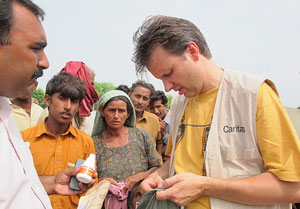
Every aid package saves lives: together with Austrian donors, Caritas helps hundreds of families in Rahimyar Khan. (in this picture: Thomas Preindl Caritas Austria)
Credits: Caritas 2010
Bishop Joseph Coutts, President of Caritas Pakistan, talks about the challenges Caritas faces in Pakistan six months after the country was devastated by extensive floods.
How would you describe the situation six months after the floods?
Bishop Coutts: There is still a lot to be done. In the areas we are working in, we are now moving from the early relief stage to reconstruction. In some regions however, especially in the South of Pakistan, people are still lacking the most basic things like food and clean water.
This is a real conflict for us. On the one hand, there are people in need of emergency aid, but on the other hand, we also need to look towards reconstruction. Caritas can’t cover all the areas affected. The floods were just so extensive. We are doing all we can and cooperating with many other NGOs working here, but a lot more help is still needed.
At the national level, Pakistan has not received enough help and that affects our work as well. The reconstruction of the infrastructure, such as roads and railway lines, would require much more money that the government just hasn’t received. That makes it harder for Caritas to reach people.
How is Caritas perceived by the flood victims?
Bishop Coutts: Caritas has been working in the field for a long time. We are accepted very well within the population. It is also because of the way we work. People in need are people in need. We don’t make differences based on languages, faith or anything else. People realized that we were there to help them. Our staff have been working very hard. We also felt the solidarity of the international Caritas network very much in these months.
How will aid efforts continue in the next months?
Bishop Coutts: Our work will now focus on three areas – shelter, health and livelihoods. We will meet at the Caritas headquarter in Rome to discuss these plans, coordinate the different Caritas members response and launch another appeal.
More than 20 million people were affected in the floods, many houses were damaged or destroyed. Building houses or providing people with shelter material so that they can rebuild themselves will remain a priority.
Livelihoods are important too. Many crops and livestock have been washed away. We are providing people with fertilizer or livestock and have carried out livestock vaccinations.
In the field of health, we are actively working on prevention. For example, we provide clean drinking water to prevent waterborne diseases such as skin rashes and diarrhoea. For this, we are setting up large water purification plants that can serve a whole village.
